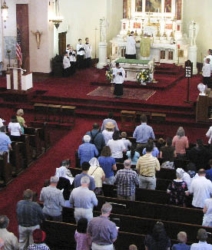Boston Latin Mass community ‘thrilled’ by apostolic letter
NEWTON -- Boston Catholics who regularly participate in the Tridentine Mass are overjoyed by Pope Benedict XVI’s apostolic letter “Summorum Pontificum” released July 7 which they say acknowledges that the Latin Mass has an enduring place in the life of the Catholic Church.
In the apostolic letter, issued “motu proprio” (Latin for “on his own initiative” and indicating a pope’s special personal interest in the subject), Pope Benedict eased many of the restrictions on celebrating Mass according to the 1962 missal. The letter goes on to say that priests may celebrate the Latin Mass in private, for religious communities and for groups of the faithful who are attached to the previous liturgical tradition without any special permission.
Father Charles Higgins, pastor at Mary Immaculate of Lourdes Parish in Newton where the bishop’s permission to celebrate the Tridentine Mass was recently transferred, said the apostolic letter is a “great blessing” to the traditional Latin Mass community.
“The people are just thrilled with it,” he said.
Previously, the pre-Vatican II Mass could only be celebrated in a parish with the special permission of the local bishop called an indult, or exemption from a general requirement of a Church rule or law.
In the Archdiocese of Boston, there is only one parish with this special permission.
Holy Trinity Parish in the South End began hosting the liturgy in 1990. The church, a German national parish, was named for closure in May 2004, and in anticipation of closure, the permission for the Latin Mass was transferred by Cardinal Seán P. O’Malley to Mary Immaculate of Lourdes on April 22.
Father Higgins said that many parishioners would have preferred to stay at Holy Trinity.
“At the same time, most people have accepted the cardinal’s decision and they are falling in love with Mary Immaculate,” he said.
Cardinal O’Malley has shown pastoral care for the Tridentine Mass community, which is grateful to celebrate weekly Mass, holy days and the sacraments. Mary Immaculate is proof that the old and new liturgies can coexist, he said.
Father Higgins added that the apostolic letter acknowledged that the Latin Mass was never forbidden and that it was never wrong for Catholics to desire it as a form of worship.
“Now this motu proprio has vindicated their battle,” he said.
Kathleen O’Connell agreed with Father Higgins’s words and said that in the past the rights of parishioners who desired the Tridentine Mass have been curtailed.
“Now, the bishops can’t withhold the Latin Mass from people who want it,” she said.
O’Connell said she hoped that bishops and priests would read the apostolic letter and listen to parishioners who desire to participate in the pre-Vatican II Mass.
Another Latin Mass participant, Susan Byers Paxson said that while she appreciates Cardinal O’Malley’s indult for a Latin Mass in the Archdiocese of Boston, one Mass is minimal, not generous. She would like more people to attend the Tridentine Mass and hopes that the Mass will be offered in more areas. Currently there are no Latin Masses in Vermont and New Hampshire, she said.
“I hope there will be many more Latin Masses available,” she added.
Paul Flanagan told The Pilot that he appreciates the spirituality and sanctity of the Tridentine Mass.
“Finally, the Church realizes the richness of this liturgy and that it fulfills a need,” he said of the apostolic letter.
Rich Parsons added that he too enjoys the beautiful and poetic language of the old rite.
He called the pope’s apostolic letter “good news.”
“We have a pope who understands that people feel this is the best way they can be nourished,” he said.
“I’m just delighted that Father Higgins is leading us,” he added.
Cardinal O’Malley commented on the apostolic letter and his visit to Rome to speak about it with the Holy Father and other bishops in his weekly blog post June 29, a week before the letter was issued.
“The Holy Father was very clear that the ordinary form of celebrating the Mass will be the new rite, the Norvus Ordo. But by making the Latin Mass more available, the Holy Father is hoping to convince those disaffected Catholics that it is time for them to return to full union with the Catholic Church,” he wrote.
The cardinal added that the Latin Mass in the archdiocese is well attended and that if the need arises for an extension of the permission, that need will be addressed.



















